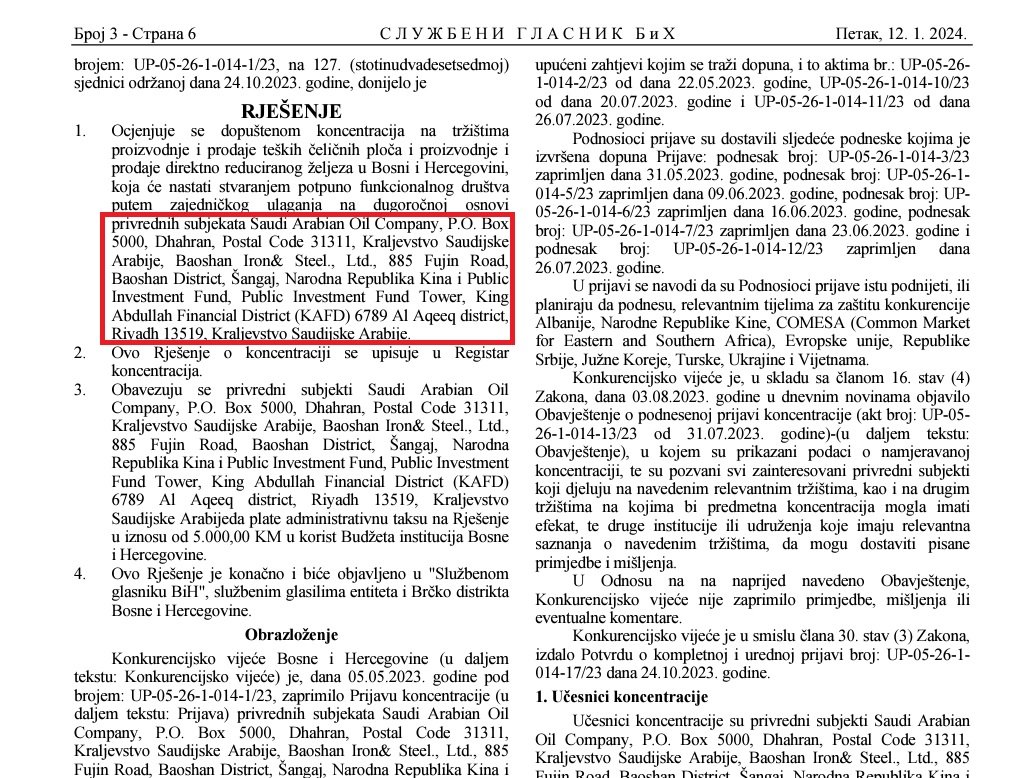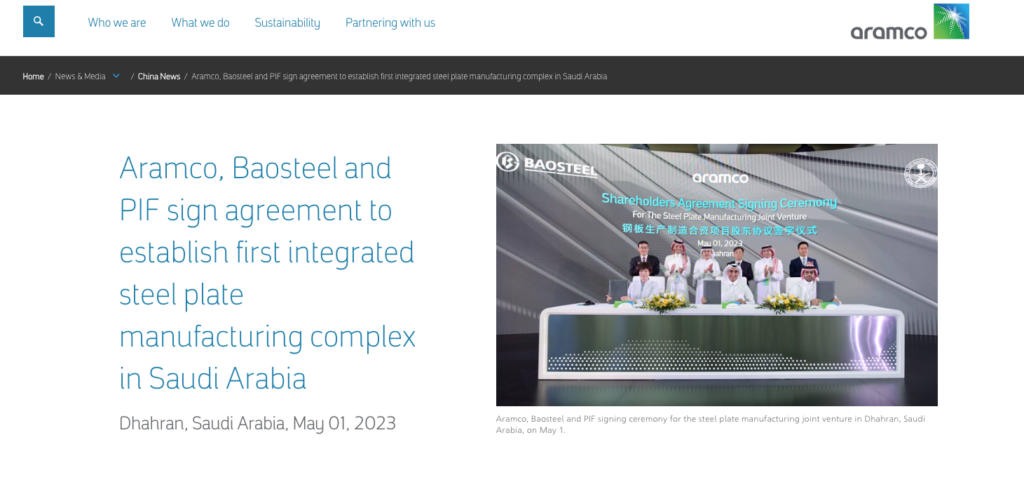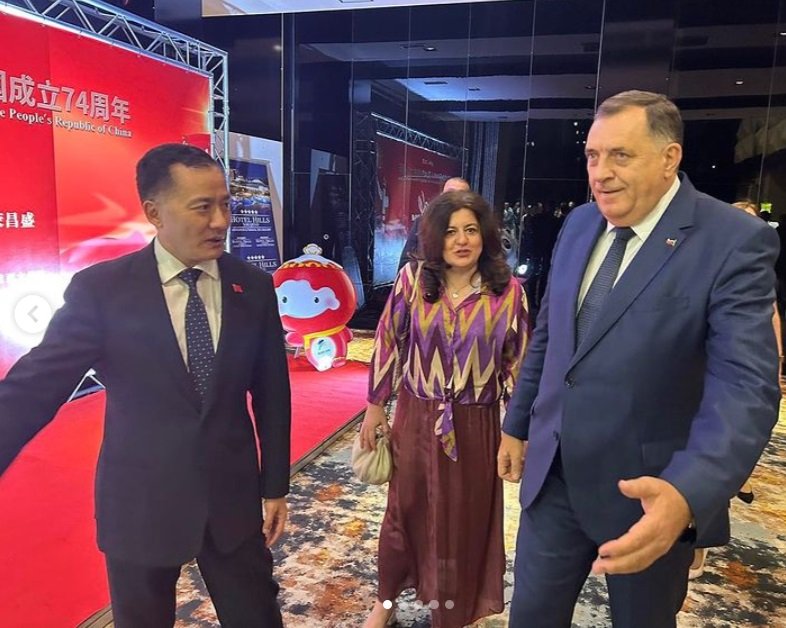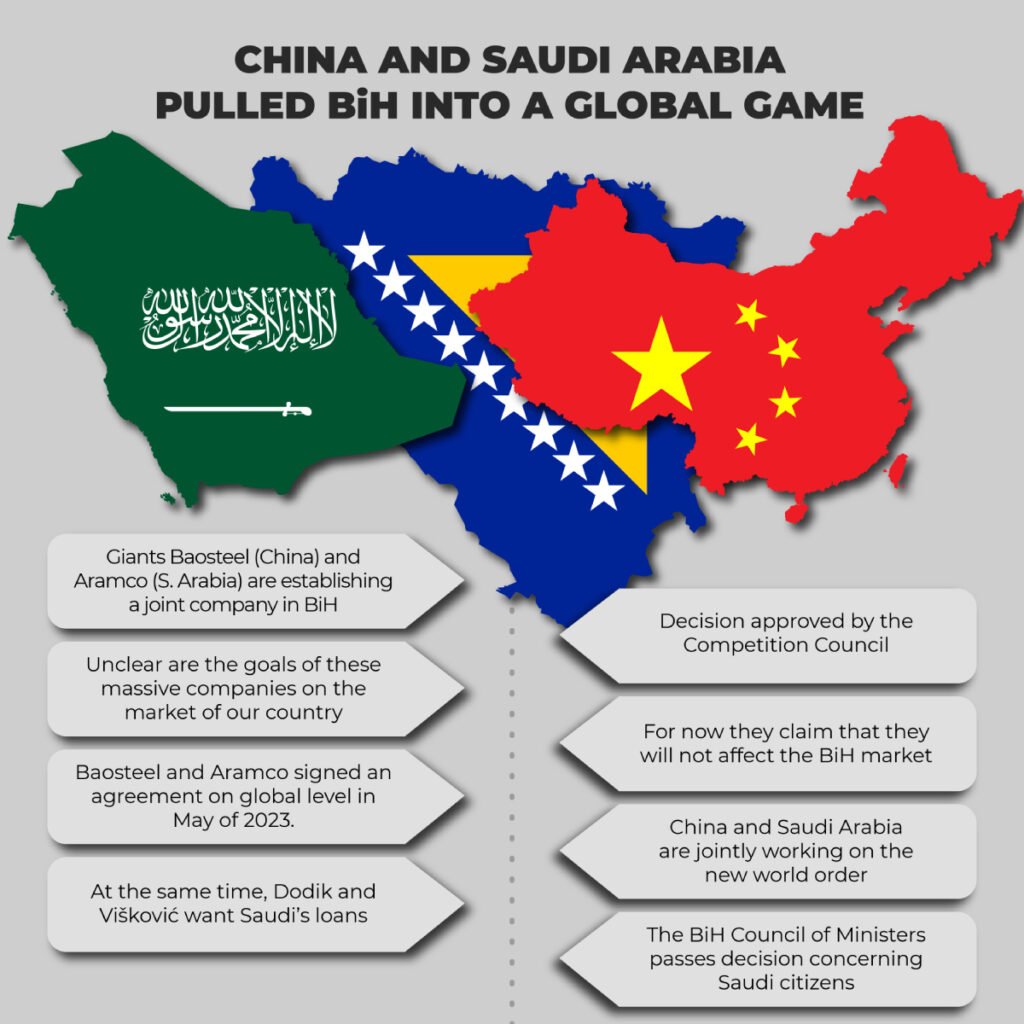Two global companies founded a joint company in BiH, but to what end? Neither Baosteel (China) nor Aramco (Saudi Arabia) were willing to comment the transaction. At the same time, the Council of Ministers, as well as Dodik and Višković, made decisions on rapprochement with the Saudis.
China has, together with Saudi Arabia, with whom it is working hard to establish a new world order, once again targeted Bosnia and Herzegovina. As Fokus learns, large companies of these two countries have recently started the procedure to found a joint company in Bosnia and Herzegovina!
One of the crucial steps towards establishing a joint company was approved by the BiH Competition Council. The decision was published in the Official Gazette of BiH in January.
Steel production
Namely, the BiH Competition Council, as stated in the decision, approved concentration on the markets of production and sale of heavy steel plates and production and sale of directly reduced iron in Bosnia and Herzegovina to business entities, the Saudi oil giant Saudi Arabian Oil Company (Aramco) and one of the world's largest steel producers, Baoshan Iron & Steel Ltd. (Baosteel) from China.
The decision states that the state fund of the Kingdom of Saudi Arabia, Public Investment Fund Tower, King Abdullah Financial District is joining them in the venture to found a company in Bosnia and Herzegovina. According to this decision, the majority owner of the new company in BiH would be the Chinese with 50 percent, while the Saudi oil giant and the fund would each have a 25 percent stake in that company.
However, certain parts of this decision of the Competition Council indicate a number of ambiguities when it comes to the operation of the future joint company of China and Saudi Arabia in our country.
Namely, the aforementioned companies had to prove to the Competition Council, as stated in the decision, that each of them had income generated by the sale of goods or services on the BiH market in the amount of at least BAM eight million.
However, the second part of the decision reads that the applicants proposed to leave the exact definition of the relevant market open, “given that the planned joint investment will not have an effect on competition in Bosnia and Herzegovina, i.e. that none of the parties to the concentration has activities in Bosnia and Herzegovina, which would be of significance for the proposed transaction”.
A question arises at this point of how they could achieve a minimum income of eight million on the BiH market if they were not active there.
Nevertheless, the decision further reads that the applicants proposed that the relevant product market be defined as the production and sale of heavy steel plates, and the production and sale of directly reduced iron due to the provisions of the Law relating to the definition of the relevant market.
Joint venture
Additionally, the decision of the Competition Council reads that, although the application in question refers to a joint investment that will not have an effect on the competition in BiH, and that will not (at least for now, [AN]) be present at the BiH market, whereat it will have an effect on the markets in the Kingdom of Saudi Arabia and the region of the Middle East and North Africa, the Competition Council had, based on the relevant provisions of the Law and the Decision on determining the relevant market, i.e. taking into account the scope of the Law on Competition, determined the market of BiH as the relevant geographic market of the concentration in question.
The BiH Competition Council has explicitly stated that this joint company founded in BiH will not participate in the BiH market. Their answer to our portal’s question reads that it will have an effect on the markets in Saudi Arabia and the Middle East and North Africa region.
– However, based on the relevant provisions of the Law on Competition and the Decision on determining the relevant market, the market of Bosnia and Herzegovina was determined as the relevant geographic market of the concentration in question. – said the Competition Council.
They also underlined that the subsidiaries of the parties to the concentration, without disclosing which ones, generate income in Bosnia and Herzegovina, thus exceeding the annual income threshold for reporting the concentration.
The legal representative of the aforementioned companies from China and Saudi Arabia, Nihad Sijerčić, could not answers a number of our questions.
– As we are not authorized to give comments, we have forwarded your inquiry to the clients and they informed us that they don’t wish to comment their transaction – said Sijerčić.
It is also interesting the abbreviated name of the Saudi company is repeatedly misspelled in the decision of the BiH Competition Council. Armaco instead of Aramco is written in this decision. Although it is a typo, it remains to be seen whether the incorrectly written name of one of the entities will have any consequences in the company registration process.
Before we analyze the global joint moves of China and Saudi Arabia aimed at weakening the position of the United States of America, it is necessary to emphasize that several interesting events took place on the BiH political scene in recent weeks in parallel with the mentioned decision of the BiH Competition Council.
Namely, at its session on January 11, just a few days after the publication of the decision of the Competition Council, at the proposal of the Ministry of Foreign Affairs, the BiH Council of Ministers amended the Decision on visas, temporarily abolishing the visa regime in BiH for the citizens of Saudi Arabia.
On February 9, the President of the RS Milorad Dodik and the Prime Minister of the RS Radovan Višković held a meeting with city mayors, municipal mayors and directors of public enterprises to whom they presented the possibilities of cooperation with the Saudi Development Fund. Višković said that the Saudi fund is important to them “because there is no limit for loan allocation.”
Dodik widely opened the doors
It is well known that RS led by Dodik has opened the doors to Chinese investments wide by agreeing to keep certain contracts worth several hundreds of millions of BAM away from the public, which was also reported by Fokus.ba.
In view of all the above, it is legitimate to question if the already present Chinese malignant influence will be followed a joint Chinese-Saudi in the foreseeable future in BiH. Especially if global events are taken into account.
Namely, China and Saudi Arabia have since 2022 started, quite aggressively, with strategic positioning in the world since 2022. First at the bilateral level, and then with concrete economic moves in the Gulf region, that is, Saudi Arabia, and then China.
The two companies that are now establishing a company in Bosnia and Herzegovina, Aramco and Baosteel, signed a contract for the construction of a “green steel” factory in May of 2023. This more than two billion dollars’ worth investment also involves the aforementioned Saudi fund that also joined establishment of the company in BiH. The mentioned project builds on the famous Chinese “Belt and Road” initiative.
Additionally, China had in March last year mediated an agreement between regional rivals Saudi Arabia and Iran to restore full diplomatic relations, which is believed to pave the way for China to expand its influence in the Middle East.
Saudi Arabia became main supplier of oil for China
It should be emphasized that in the meantime Saudi Arabia became the main supplier of oil to China, while Beijing became the main economic partner of Saudi Arabia.
At the end of January this year Saudi Arabia became a new member of the intergovernmental organization BRICS, where it strategic partner China was already along with Brazil, Russia, India and South Africa. Egypt, Ethiopia, Iran and the United Arab Emirates joined Saudi Arabia as new members.
This alliance, which is under the dominant influence of Russia, but also China, was founded in order to break the dominance of the West, as well as to capture new markets.
The respected American foreign policy magazine The Diplomat analyzed the implications of the alliance between China and Saudi Arabia, especially through the prism of Hamas attacks in Israel and Israel's genocidal retaliation against Palestine.
As it is stated, China is balancing very clumsily, trying above all to keep Iran, its strategic partner in the Middle East, far away from these events. It is also stated that, despite these ties with China, it is unlikely that Saudi Arabia will renounce its close political and strategic relations with the United States of America.
If the Israel-Hamas conflict escalates, reads this analysis, Saudi Arabia will seek protection from the United States of America, as it remains the main military presence in the Middle East.










